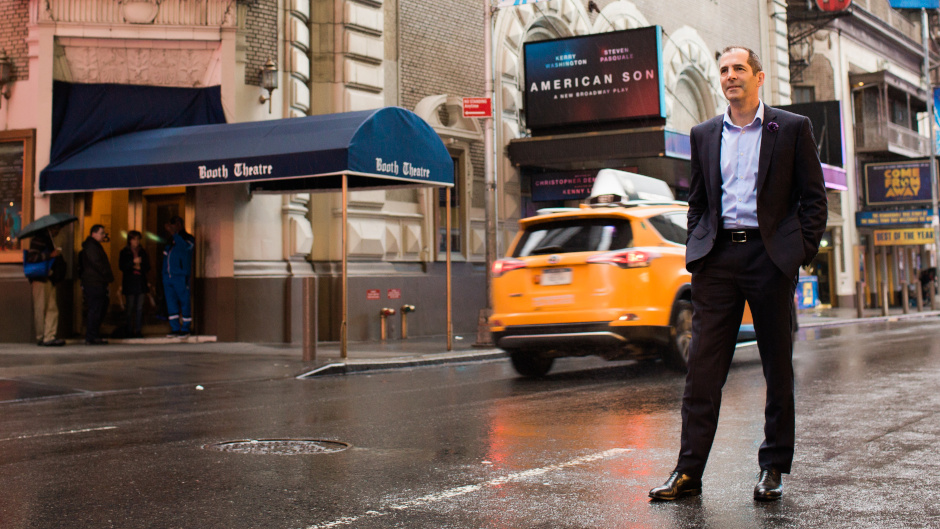On this crisp November morning, the marquee advertises American Son, starring Kerry Washington, of Scandal fame, and Steven Pasquale, known for his role on Rescue Me. The story is of one of the vulnerability of young black men in interactions with police told through bi-racial parents searching for their son.
The Miami lawyer will see the show tonight, opening night, with his wife Stephanie and his middle school aged daughters by his side. He has seen the show dozens of times, in previews, on other stages, but first in his head. He is the playwright.
The Road to Broadway
He once thought he’d be an actor and struck out to Hollywood after college to hone his chops. Five years and few roles later, he admitted that he, even though he looks a little like Doug Stamper on House of Cards only taller, was likely never going to be “discovered.” Reading and writing reviews of hundreds of scripts for Universal Studios had paid the rent, but it didn’t scratch the itch to be a creative force in the universe.
With the tall palms of Sunset Boulevard in his rearview mirror and an acceptance letter from Miami Law in the glovebox, Chris Brown came home. “I still had some thoughts of going into politics and law school seemed like a way to go about that. It’s one of the few big decisions I’ve made that I’ve never regretted. I feel such gratitude to the University of Miami because they basically gave me a free ticket. The scholarship gave me a huge advantage in that I wasn't chasing student loan debt after."
His three years of law school went by filled with trial advocacy and law review, and the plan to run for office someday loomed somewhere far ahead. As a good start, a job as a prosecutor with the Miami-Dade State Attorney’s Office awaited him after graduation, where his Hollywood skills came in very handy.
“The practice of law involves having procedures that you follow to help you tackle problems, and that kind of problem-solving is handy in playwriting,” he says. “I make timelines where I put the facts, documents, or witnesses that help you establish information, where you are trying to control when and how it comes out.
“The American system of law is adversarial, meaning there is conflict inherent in it, and that is what good playwriting is about: good conflict that leads to some end,” he says.
It was at the prosecutor’s office that he met and married Stephanie Demos, and the once Chris Brown became Demos-Brown, melding their names to cement the connections to one another and their two girls.
A Not So Secret Life
Demos-Brown loves to practice law and enjoys the life and the trial practice firm he and his wife have built, Beasley, Demos & Brown, LLC. But he also has a not so secret passion as a playwright, lived late at night, early in the morning, and when traveling. He has written plays, comedies, and dramas, mostly set in Miami, with subjects ranging from the Cuban diaspora and cocaine cowboys to satires of the American Constitution in The November Laws and a dark comedy about the U.S. tort system in Wrongful Death & Other Circus Acts.
American Son, which Netflix is adapting with Washington and Pasquale, is not so much a departure from his earlier works, but more of a taking on of a subject that chafed at him: “Three incidents prompted the play: Eric Garner, Treyvon Martin, and Tamir Rice. Treyvon Martin was a case where I could absolutely see any son; accosted by some maniacal, self-designated vigilante. Eric Garner was one where I could actually see the police point of view.”
“Our tribalism is magnified when we talk about race. Our discussions of race tend to be discussions that happen among our own tribe. You don't often get into frank discussions about race with people who are not your own race, so what you end up seeing are public projections of people of different races rather than genuine feelings and internal differences,” Demos-Brown says. "I hear things among family members and friends that would shock (or probably wouldn't) African Americans. And I’m sure around a Black dinner table at Thanksgiving there are things that are said that white people would be very surprised to hear."
Never mind that Demos-Brown (and his wife) are founding members of Zoetic Stage, a company dedicated to staging new works homed at the Adrienne Arsht Center; he has won most every South Florida theatre award; and he now has a show selling out nightly on Broadway, he is in no hurry to change up his personal story.
"If there were a way to make a living exclusively writing and not have to move my family to Los Angeles, I'd probably do it, but we have a wonderful practice, and our home is here," he says.
"What I found invaluable about UM is that most of the people who graduate from the law school practice here, so there is a large referral network and people who give you support in your practice," he says. "If you want to practice in Miami, there really isn't a better place to go. And I still spend 80% of my time practicing law."

